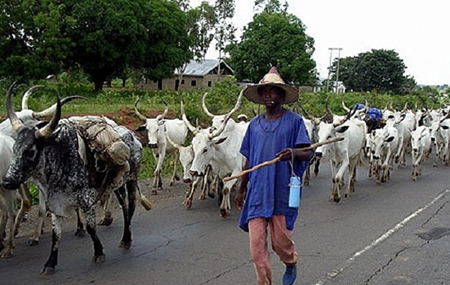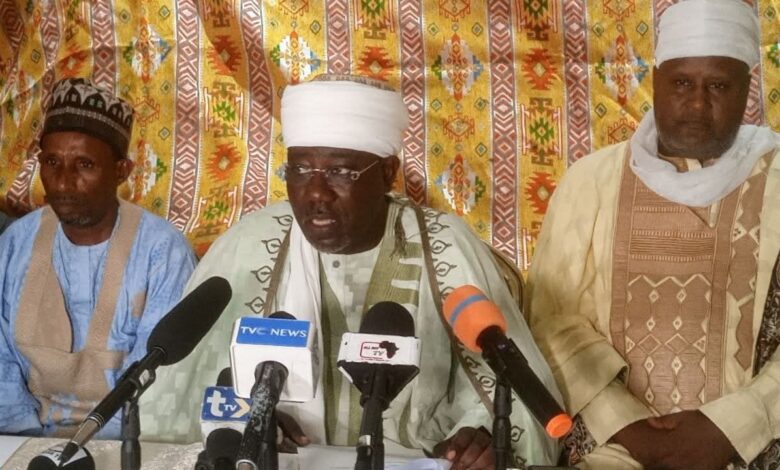In an effort to bring lasting peace to farmers-herders relations and sustain the cordial relationship between Fulani communities and their host settlements, the Council of Fulani Chiefs of South West Nigeria, has rolled out measures aimed at curbing insecurity in the region, extending also to Kwara State in Northcentral Nigeria.
This was contained in an address delivered by the Chairman of the Council and Sarki Fulani of Lagos, Mohammed Bambado II, during a world press conference, held in Lagos.
Bambado II announced that the council had unanimously agreed to impose an absolute ban on night grazing, underage herding, and the carrying of firearms or other dangerous weapons by herders, saying the decision would go a long way in restoring sanity and ensuring peace within the livestock sector.
The chairman recalled the Fulani community’s over 200 years of peaceful coexistence with indigenous landowners in Yorubaland, stressing that the council remains firmly committed to preserving and passing on this legacy of harmony to future generations, further disclosing that the Council of Fulani Chiefs of Southwest, Nigeria had resolved to work in collaboration with the Development Agenda for Western Nigeria (DAWN) Commission, describing it as the apex body of the Fulani community in the region.
Condemning all forms of criminality, the Sarki Fulani of Lagos declared that they decried in totality, any act of banditry, kidnapping, farmland destruction, or farmer-herder conflict linked to the Fulani community, calling on security agencies, particularly the Office of the National Security Adviser, to remain deeply committed to fishing out criminal elements and their collaborators within host communities. “We also urge the media to report responsibly to avoid ethnic profiling”, he added.
Bambado II also announced the council’s total ban on the unregulated influx of migrant herders with large herds of cattle into the Southwest, noting that such practices have been a major trigger for conflict. “Considering the prevailing security realities, it is necessary to discourage indiscriminate migration of herders from one state to another. Instead, we must encourage modern and sustainable grazing patterns in our respective localities”, he added.

Other resolutions reached by the council includes, Ratification of Sarki appointments: All new appointments of Sarki Fulani or representatives must undergo scrutiny and approval by the council.
Meanwhile, a livestock sensitisation and engagement tour is to be launched to educate herders on global best practices in livestock production, adherence to the law, and peaceful coexistence, Integration of Kwara State.
The council resolved to incorporate Fulani communities in Kwara State into its structure, citing the state’s strategic border with Ekiti, Oyo, and the Benin Republic as a security concern. The council also called for the revival of nomadic schools across Fulani settlements, describing illiteracy as a major driver of insecurity.
Other interventions include data collection initiative, which is a programme tagged “Cattle Farmers Data Collection Across Southwest”, to document herders and their cattle for better management and development planning.
The council also unanimously banned violent traditional festivals within Fulani communities that often result in deaths and injuries, stressing that such practices are incompatible with present security realities.
The world press conference was attended by Sarkis, Ardos, and Miyetti Allah leaders from across the Southwest and parts of the Northcentral zone.
In a related development, a bill, which seeks to ban open grazing and establish a national agency for the regulation and management of ranches in Nigeria has passed second reading in Senate. The bill is titled: “A Bill to establish a National Animal Husbandry and Ranches Commission for the regulation, management, preservation and control of ranches throughout Nigeria; and for connected purposes, 2024”.
It was sponsored by Senator Titus Zam, an All Progressives Congress member representing Benue North-West Senatorial District in the National Assembly.
Zam in his lead debate, noted the increasing wave of violent conflicts that erupt from pastoralists and farmers interaction in Nigeria, saying such conflicts had assumed a war-like dimension with far reaching negative impact on the people and country as a whole.
In his contribution, Senator Hussein Uba, representing Jigawa North-West, called for extra caution in passing the bill, given its trail of controversies in the past. Other senators, who supported the bill contended that the proposed Commission would manage the farmers-herders crisis. Hence, it should be passed without further delay.



